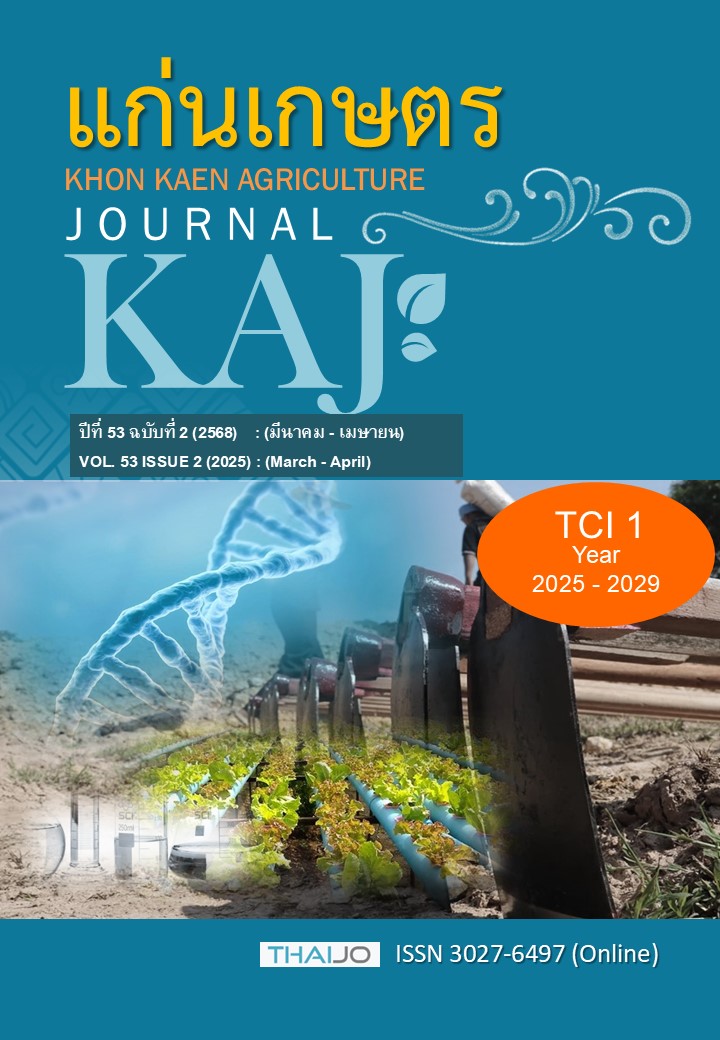Approach to adapting Bhutan's One Gewog One Product (OGOP) initiative by learning from Thailand's One Tambon One Product (OTOP) model
Main Article Content
บทคัดย่อ
This study evaluated the implementation of the Sufficiency Economy Philosophy (SEP) in Bhutan and Thailand and recommended adapting successful practices from Thailand’s One Tambon One Product (OTOP) model for Bhutan’s One Gewog One Product (OGOP) initiative. Data were collected from six Community Learning Centers (CLCs) in Bhutan and three OTOP businesses in Thailand through surveys, interviews, and focus group discussions. Respondents, primarily aged 30-50, showed differences in education levels, with 100% of Thai participants having completed formal education compared to 67% in Bhutan. Income reliance also varied, with only 26.7% of Bhutanese and 47% of Thai respondents depending solely on community products. Statistical analyses revealed that Thai farmers demonstrated a stronger understanding of SEP, which was reflected in higher well-being and economic outcomes (mean = 4.62 in Thailand vs. 3.68 in Bhutan, t-test = 7.612, P < 0.05). Bhutanese CLCs saw significant improvements in well-being after the project (P < 0.05), with scores increasing from 2.85 to 3.68. Despite these improvements, challenges remained in market access, capacity building, and product development. The study recommended strengthening government policies, enhancing training programs, improving market access, and promoting SEP for sustainable development in Bhutan’s OGOP project. Collaboration with private and international partners was also advised for long-term success.
Article Details

อนุญาตภายใต้เงื่อนไข Creative Commons Attribution-NonCommercial-NoDerivatives 4.0 International License.
เอกสารอ้างอิง
Absolor, J. L., C. B. Orpia, M. T. T. Garcia, and O. A. Batara. 2022. The economic significance of One Town One Product (OTOP) Program in the Province of Ilocos Sur. International Journal of Social Science Research and Review. 5: 170-186.
Acharya, J. 2019. Lessons for women group enterprises management from One Tambon One Product rural development programme in Thailand. Vidyasagar University Journal of Economics. 20: 68-83.
Barua, P., and P. Tejativaddhana. 2019. Impact of application of sufficiency economy philosophy on the well-being of Thai population: A systematic review and meta-analysis of relevant studies. Journal of Population and Social Studies. 27: 195-219.
Chiang Mai Rajabhat University (CMRU). 2023. OGOP product development manual 2022-2023. (Faculty of Agricultural Technology), Chiang Mai Rajabhat University, Thailand.
Chantarasombat, C., and P. Agsonsua. 2021. KM, PAR, Sufficiency economy philosophy, growing and producing phak waan pah for self-reliance. Multicultural Education. 7: 222-236.
Food and Agriculture Organization of the United Nations (FAO). 2023. Thailand: The grassroots economy reaps benefits from targeted support under One Tambon One Product. Available: https://www.fao.org/one-country-one-priority-product/asia-pacific/good-practices/detail/thailand--the-grassroots-economy-reaps-benefits-from-targeted-support-under-one-tambon-one-product/en. Accessed Oct. 20, 2024.
Igusa, K. 2011. Rural small entrepreneurs and SDSI policy and in Malaysia: How Malaysian type of OVOP functioned (Draft). Available: http://www.iovoppa.org/files2/Igusa2.pdf. Accessed Oct.20, 2024.
Kansuntisukmongkol, K. 2016. Philosophy of sufficiency economy for community-based adaptation to climate change: Lessons learned from Thai case studies. Kasetsart Journal of Social Sciences. 38: 56-61.
Kurokawa, K., F. Tembo, and D. W. Velde. 2010. Challenges for the OVOP movement in Sub-Saharan Africa: Insights from Malawi, Japan and Thailand. Japan International Cooperation Agency Research Institute, Tokyo, Japan.
Lusha, E. 2024. National and international collaboration and its impact on economic development. Interdisciplinary Journal of Research and Development. 11: 76-83.
Mettathamrong, J., P. Upping, and S. Deeudom. 2023. Approach to applying sufficiency economy philosophy in community enterprise management towards sustainability. Sustainability. 15: article ID 5338.
Mongsawad, P., and N. Thongpakde. 2016. Sufficiency economy philosophy: a holistic approach to economic development and mainstream economic thought. Asian Social Science. 12: 136-142.
National Statistics Bureau. 2022. Bhutan Living Standards Survey Report. Royal Government of Bhutan.
Naipinit, A., T. P. Na Sakolnakorn, and P. Kroeksakul. 2013. Sufficiency economy for social and environmental sustainability: A case study of four villages in rural Thailand. Asian Social Science. 10: 102-111.
Nitikasetsoontorn, P., P. Supatsophol, and S. Yensamran. 2010. Promoting community learning to develop OTOP products to the five-star level: A case study of the Bang Jaocha Woven Bamboo Products Groups in Pothong District, Ang-Thong Province. In 6th International Conference on Interdisciplinary Social Sciences, August 2010. University of Cambridge, United Kingdom.
Office of the Royal Development Projects Board (ORDPB). 2017. The philosophy of sufficiency economy (11th ed.). Bangkok, Thailand: Office of the Royal Development Projects Board.
Penjor, U. C. 2024. Green tea cooperative’s path to prosperity. Available: https://kuenselonline.com/green-tea-cooperatives-path-to-prosperity/. Accessed Oct.21, 2024.
Pholphirul, P., P. Rukumnuaykit, T. Charoenrat, A. Kwanyou, and K. Srijamdee. 2022. Service marketing strategies and performances of tourism and hospitality enterprises: implications from a small border province in Thailand. Asian-Pacific Journal of Marketing and Logistics. 34: 887-905.
Queens Project Office (QPO). 2018. Enhancing rural livelihoods through promotion and diversification of one gewog one product (OGOP) program. Thimphu, Bhutan. Queens Projection Office.
Queens Project Office (QPO). 2022. One Gewog One Product (OGOP). Thimphu, Bhutan: Queens Projection Office.
Sitabutr, V., and Paitoon, P. 2017. Thai entrepreneur and community–based enterprises’ OTOP branded handicraft export performance: a SEM analysis. Available: https://doi.org/10.1177/2158244016684911. Accessed Oct.20, 2024.
Srisawat, T., P. Makmee, and P. Ruangtip. 2021. Business success for sustainability indicator development of one Tambon One Product. ABAC Journal. 41: 224-246.
Sura, K. 2017. OTOP leaders in Chiang Mai Province of Thailand. Journal of Global Studies. 34: 176-196.
Tanwattana, P. 2012. Difference between OTOP movement and Non-OTOP movement: Role of local leaders for self-reliance and regional development in Thailand. P. 53-74. In: H. Murayama. Significance of the regional one-product policy: How to use the OVOP/OTOP movements. The Policy Science Association of Ritsumeikan University, Japan.
Ura, K., S. Alkire, T. Zangmo, and K. Wangdi. 2012. An extensive analysis of GNH Index (1st ed.). The Centre for Bhutan Studies. Thimphu, Bhutan.
Wongkumchai, T., S. D. N. Ayuthaya, and S. Kiattisin. 2020. The consistency of the sufficiency economy philosophy (SEP) with sustainable development goals (SDGs). Journal of Mobile Multimedia. 16: 413-448.


